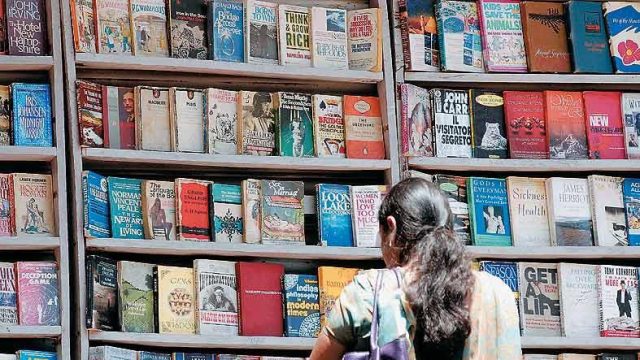For as long as I can remember, the Book Bazaar at Abids has been around. My father used to say it’s been there since he came to the city in the early 1970s, which makes this weekly affair a nearly four-decade-old institution.
Through my teens, Sundays meant a heavy brunch and then off to Abids, where second-hand books were neatly laid out on the pavement. As the road curved around the Head Post Office, the type of person browsing would change. If Abids had all those looking for magazines and fiction, Koti had all the earnest students who came hunting for textbooks they would not otherwise be able to afford — medical, legal, engineering and, in later years, computers.
I would take an auto and get off at the Taj Mahal hotel junction. From then on, nothing could distract my attention from the books on the pavement. I was a hound, sniffing even among the tied stacks of books the sellers hadn’t yet opened. A book only had to have its cover off and bound in nondescript yellow for me to pick it up, sure I had scented victory. Sometimes I was right: this is how I picked up nearly all my Rafael Sabatinis, including one copy of Anthony Wilding, a special war edition for the Armed Forces with minuscule print.
My route was invariable: start at the jewellery shops, turn left into Metro Estate, where the Hollywood Shoes and Meena Bazar Extension shops are, come out into Tilak Road and turn back to follow the main road until the GPO.
It is with great nostalgia that I set off this weekend, armed this time with a bottle of water and a huge bag of books I intend to exchange. Parking opposite Santosh Cinema, I start down the road and in a few seconds I feel the familiar sense of anticipation: what will I find today? Would I chance upon some out-of-print gem? As I pass the books laid out, I remember that I found my Pocketful of Ribaldry here, outside Vithaldas; my 1066 and All That over there by the steps. The trick, always, was to be nonchalant, to pretend that the book you wanted very, very badly, was just another book you could live without but one you might take off the seller’s hands.
The first thing that strikes me is the unusual preponderance of 1) magazines, 2) pirated copies of bestsellers, 3) English readers and badly illustrated books for children. I also notice that more shops have cardboard notices with fixed prices for each pile of books. Nobody seems to want to bargain anymore.
In the shaded pathways near Hollywood Shoes, I let my eyes adjust to the dark. This is where the big guns usually are. I am relieved to find they are there but dismayed to see they are sharing their space with the person who, during the week, sells hair clips, cheap lipsticks and nail polish. But in a minute I forget about all the junk jewellery, because I have found a pile of P.G. Wodehouses bound in red, obviously discarded by some library. Inside the binding the old original covers are intact. I’m only sorry there are no longer any new Wodehouses to buy.
Taking a deep breath, I come out on to Tilak Road and blink at the sunshine. On my right is the person who usually exchanges my books. First I scout around to see if he has anything I want. He has well-thumbed copies of the Jean M. Auel series; a Margaret Drabble; on the ground, piled up all anyhow are three hardcover editions of the Mary Stewart Merlin series, for Rs 10 each (inside, the sticker says Rs 80).I remember that my copies of these books have broken spines and loose pages and we begin to talk. This is how the exchange works: every book I sell to him is worth Rs 10, regardless of how popular or esoteric it is. In return I can take one book and give him an additional Rs 10 per book. I still make a spirited attempt to bargain and leave with the entire trilogy, a Paul Zindell and a Josef Skvorecky.
Books exchanged, I head towards GPO. Here, the pavements are inexplicably bound off from the road, as if the books were in danger of spilling over and disrupting traffic. Just at the curve of the road, a man with a cart has a heap of blood-red watermelons. The crowd there is as thick as the swarm of flies. It’s time to head back to my car but I turn to look one last time at the road as it branches off: on one side towards Koti, where the book bazaar is no longer, having been demolished (and later rehabilitated in a dingy subway) by the government in 2007; and on the other, towards Nampally, where the pavement holds only luggage, as a road leading to the railway station should. I watch the people bend to pick up books, ask for something from the bottom of piles, discuss their finds with their companions and catch myself smiling.
Driving back, I am conscious of a feeling of peaceful triumph, a serotonin rush that only yoga and book hunting can give me. I have to consider the day seized.




